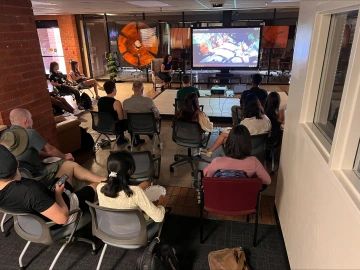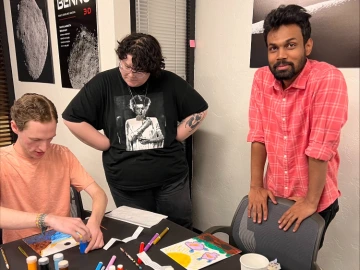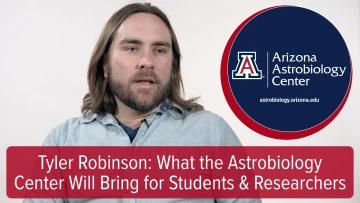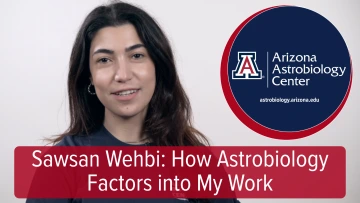OCTOBER 2024
From the Director
Dear Colleagues and Friends of the Arizona Astrobiology Center,
As October unfolds, I am delighted to reflect on the remarkable progress we’ve made at the Arizona Astrobiology Center (AABC). This month, our team achieved a significant milestone with the submission of our Step-1 proposal to NASA’s ICAR (Interdisciplinary Consortia for Astrobiology Research) program. This proposal, titled Astrobiology in Carbonate-Rich Aqueous Environments, seeks to answer one of astrobiology’s most compelling questions: how the chemical evolution of carbonate-phosphate-rich aqueous environments contributes to our understanding of life’s origins, persistence, and habitability.
In addition, we are excited to announce that the AABC is spearheading an effort to propose a Science and Technology Center (STC) to the NSF, focusing on the intersection of quantum mechanics and biological systems. Our vision for this STC is to explore the quantum origins of life and biological processes, a cutting-edge research frontier that could transform our understanding of life's fundamental mechanisms. At a recent Astrobiology Luncheon, we discussed the initial framework of this proposal and are now inviting the broader community to contribute ideas and expertise. Specifically, we are looking for innovative research concepts, interdisciplinary collaborations, educational programs, and resource needs that align with this groundbreaking initiative. If you are interested in contributing, please send your ideas to me by October 19.
At the AABC, we’re not only fostering groundbreaking research but also cultivating a vibrant community through our Astrobiology Lounge. This month, we’ve had a series of exciting events, starting with our Board Game Night, which brought together faculty, students, and staff for an evening of fun, strategic thinking, and camaraderie, strengthening the bonds within our astrobiology community. At Movie Night we screened Interstellar, followed by an engaging discussion with Erika Hamden about the film's scientific themes and the portrayal of space exploration. Please see the announcement below for our next Movie Night coming up on October 17th. We also hosted an Art Night, encouraging creativity and a different perspective on science through visual expression. We look forward to continuing these activities as part of our commitment to building a collaborative and dynamic environment.
I also want to take a moment to recognize the incredible achievement of the Hera mission team, which successfully launched this month. Watching the launch brought back memories of the OSIRIS-REx mission's early days—the emotions, the anticipation, and the extraordinary teamwork required to make it a reality. The Hera mission is a pivotal project for both the small body community and planetary defense. The excitement of witnessing Hera's launch is amplified by the mission’s potential to deliver groundbreaking insights into binary asteroids.
As we continue to push the frontiers of planetary science and astrobiology, I encourage all members of our community to remain engaged in these exciting projects. Whether it’s through contributing to the NSF STC proposal or advancing our research with missions like
Hera, we are at the forefront of discoveries that will shape our understanding of life and our universe.
Take care,
Dante Lauretta
Director, Arizona Astrobiology Center
Sci-Fi Movie Night! with Dr. Erika Hamden

Dr. Erika Hamden recently led a dynamic discussion on the film Interstellar, guiding us through an exploration of some pre-selected clips. The event brought together a diverse group of guests, including faculty, staff, and friends from various departments across the University of Arizona. The discussion was lively, with engaging questions from the audience, and Dr. Hamden’s insightful commentary deepened our understanding of the science and themes within the movie. It was an inspiring and thought-provoking event, fostering connections and curiosity among attendees.
Astrobio Lounge - Art Night!

Astrobio Art Night was a creative and inspiring success! Led by Astrobiology Ambassador CJ Smith, participants were invited to imagine life in extreme environments through art. The event focused on extremophiles—organisms that thrive in the harshest conditions on Earth—sparking curiosity and creativity. Guests engaged in hands-on art projects, translating scientific concepts into vibrant visual pieces. The night was filled with laughter, learning, and some truly amazing artworks, making it a memorable experience for everyone involved.
AABC Members Cross-departmental faculty networking and professional development meeting
On Wednesday, October 9, we held a productive members meeting with the primary focus on developing a proposal for the National Science Foundation’s (NSF) Science and Technology Centers (STC) program. Colleagues from across campus joined the discussion, expressing interest in contributing to this exciting initiative. We discussed potential partnerships with organizations such as Google Quantum AI and Kyushu University to enhance our research capabilities and broaden the scope and impact of our proposal. The collaboration and enthusiasm in the room were palpable, setting the stage for a strong and innovative proposal submission.
Getting to Know AABC Members
This month we introduce Dr. Tyler Robinson & Ph.D. Student Sawsan Wehbi

Tyler Robinson: What the Astrobiology Center Will Bring to Students & Researchers
Arizona Astrobiology Center member Tyler Robinson (Lunar and Planetary Laboratory, University of Arizona) introduces himself and tells us what the AABC will bring to students and researchers on campus and beyond. Link to video

AABC’s Sawsan Wehbi: How Astrobiology Factors into My Work
Arizona Astrobiology Center member Sawsan Wehbi (Genetics Graduate Interdisciplinary Program, University of Arizona) introduces herself and tells how astrobiology factors into her work. Link to video
